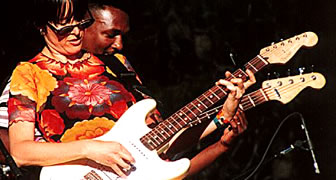 |
 |
||
A CONVERSATION WITH MICHELLE SHOCKED (continued)
PM: Do you play other instruments yourself?
MS: I play bad fiddle, did you see that the other night?
PM: No, I was sick, and had to leave after a half dozen numbers.
MS: I saw on the fiddle, and pick a little mandolin, though that's lain fallow now for some time.
PM: You're a good electric player.
MS: I've been working on that for seven years now, I started out just acoustic.
PM: I hang in the middle a lot and play an old jazz box, so it feels acoustic and sounds electric.
MS: Oh yeah, I know your type. When I crossed over, I committed fully. But I stick with an old Fender Deluxe Reverb, I don't get into any fancy electronics.
PM: It's great to see you out with a fully produced record. I couldn't access the website, www.mighty-sound.com, there seems to be some kind of temporary glitch. So I lack some information about players and other credits. Who's that fabulous steel player on Deep Natural?
MS: That'd be Dave Pearlman. Isn't he amazing? Secret weapon #1. He did his roadwork in the 70s, with Hoyt Axton and Dan Fogelberg. He told me some wild story about playing in a volcano in Hawaii. He had the gig at The Palomino in L.A. for some years. But in recent years, he runs a studio in the valley called Rotund Rascal. He's one of those great road players that eventually turn themselves into secret studio weapons.
PM: Who produced Deep Natural, and where?
MS: It was recorded in about four different places, up in Cotati…
PM: Cotati? [Northern CA] That's my old stompin ground.
MS: Yeah? We did some work there, and we also recorded in Austin, in Dublin, and at Rotund Rascal in the valley. Bart Bull, my husband and collaborator, with Fiachna O'Braonain, we write songs together, they co-produced the record. Except one song produced by Peter O'Toole.
PM: It's a great record. I like Dub Natural, too.
MS: Thank you. Yeah, Dub Natural is a little twist, right?
PM: Yeah, I got a kick out of it. One more example of how individuated you are.
MS: Outta my way, comin through.
PM: You know, at the beginning of the show, there was a little ripple, where you were giving the Nashvillians the business about living here. Did we really like living here, and all that. I wondered if you hated it here for some reason.
MS: Well, it's a little bit of the Steve Earle rant. Nashville has so thoroughly indemnified its segregated culture that it's almost a lost city in that regard. He talks about it in discussing his drug days, about having to go to the other side of town to score. I don't know, it reminds me of East Texas. That drove me so crazy that I finally decided to go somewhere where I didn't feel like such a strange bird.
PM: Does New Orleans have a different feel in that sense?
MS: [laughs] I like to say this about New Orleans. You know how the basic idea behind racism in this country is that white folks think they're better than black folks, right? New Orleans has a long tradition of an entirely different race known as Creole. They think they're better than everybody. That comes as quite a shock to Yankees and other white folks. They encounter a particular kind of black superiority that they'd never imagined in their life.
PM: That's interesting, and new to me.
MS: They're more refined, more cultured, more civilized. In the French days, they were the ones that were marrying interacially, and skilled and schooled in the arts. Jelly Roll Morton is an example of that, actually, the "we do it better than everybody else" mentality.
PM: So they share the stereotypical superiority of the French.
MS: Yes. That's a fair comparison. They figure if you have culture, that's all you need. So I thought I knew a lot about race relations when I arrived in New Orleans, but I quickly learned to shut up and observe.
PM: And are the Creoles amazing, in fact?
MS: The Creoles are amazing. Allan Touissant, for example. He was someone I went down there to work with. It's an amazing heritage.
PM: I've never spoken with anyone personally who's worked with the great Allan Touissant. What's he like?
MS: Bart says he'd rather watch Allan Touissant fold his jacket and lay it on the side of the piano than hear most musicians perform. Allan said to me that he regretted being raised so Creole Catholic, because it made him feel like he was way too inhibited. And he's drawn to funky stuff as much as anybody.
PM: And he's still alive and well, in good health?
MS: Yeah, he's doing pretty good. continue
print (PDF) listen to clips puremusic home